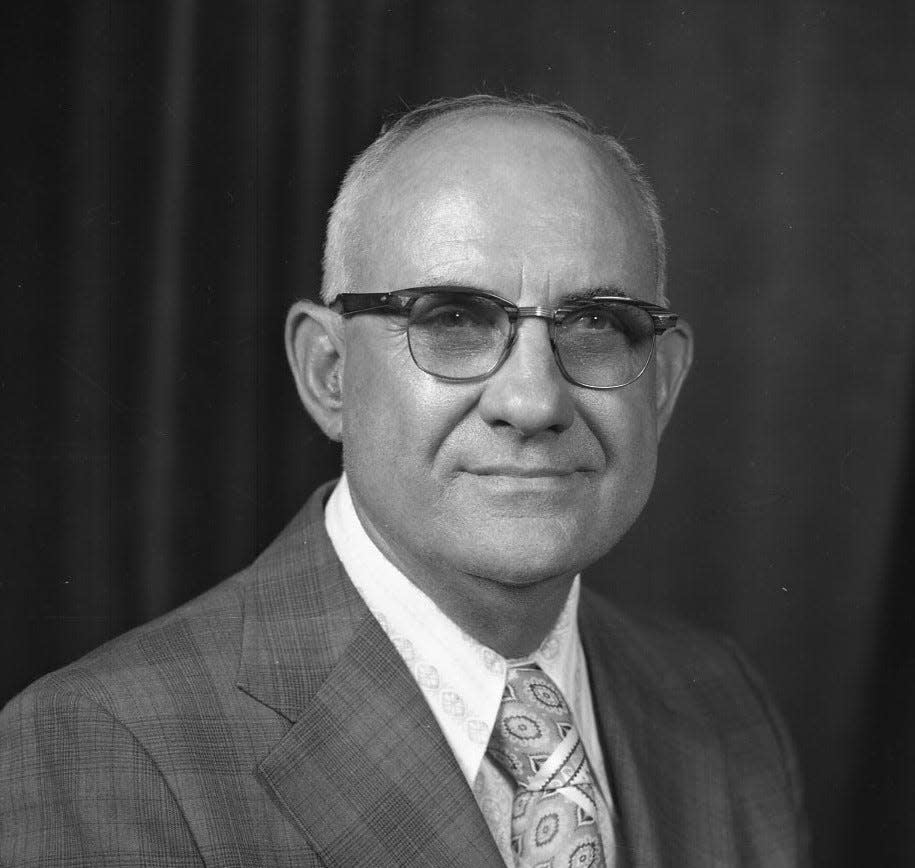Weston Wednesday: Pomeroy puts Bartlesville on wheels

Editor's Note: In collaboration with the Bartlesville Area History Museum, the Examiner-Enterprise has revived the late Edgar Weston's 'Revisiting the Past' columns that ran in the newspaper from 1997-99. Weston's columns recount the history of Bartlesville as well as Washington, Nowata and Osage counties.
The first major business venture for early Bartlesville outside of cattle ranching, storekeeping, and milling grain was the oil industry.
It was launched when the first commercial oil well in Oklahoma was drilled on April 15, 1897. A great rush for leasing began immediately and talk of leasing 100,000 acres or a blanket lease on a great portion of the Cherokee Nation was in the process. The Department of Interior thought otherwise and closed down leasing in the Cherokee Nation until the allotment of land to individual Cherokees could become a reality.
The oil boom was in great anticipation awaiting the land leasing with lease brokers and buyers, contractors, stock brokers, bankers and the general drift that follows a boom arriving daily.
The sleepy little village on the Caney River was bulging with new arrivals when the Department of Interior released the Cherokee Nation for oil leasing in 1904, and by this time there were three hotels, two banks, one ice company, blacksmiths, livery barns, one railroad completed and one being built, a telephone system, a real estate business and a brick plant being built.
Bartlesville was on the move and drawing the attention from a wide area.
Fletcher E. Pomeroy was born May 9, 1880 at Prairie Horne, KS. His father was a blacksmith and wagon maker and taught Fletcher his trade. He worked at blacksmithing at Cherryvale and Neosho Falls, KS before coming to Bartlesville, I.T. in October, 1905 and began his business. In 1906, he built his first blacksmith shop on West Third Street between the railroad tracks and Short Ave. He placed an ad in the newspaper: “Bring Your Horse to Pomeroy to be Shod. Your horse will not be abused and the shoes will fit so he can travel easily. You will be treated courteously and we will give you full value for every dollar spent here.”
By 1908, Pomeroy had expanded his business to a Carriage Works and Blacksmith Shop at 307 Short Ave. (just south of Frank Philips Blvd., near the entrance to Phillips parking lot) in a new building built by Pomeroy. He built wagons, buggies, enclosed cabs, all horse-drawn to carry passengers. He also designed and built special wagons to haul the town's drinking water in bottles, ice cream wagons, wagons to haul individual bottles of nitroglycerine, grocery wagons and pleasure vehicles.
The town’s water was not usable except to mix in plaster for the cisterns and to put out fires. It came from the Caney River and was always colored with the gumbo clay in the river bed. One of the town’s greatest needs was clean, clear drinking water, so local companies were organized to provide bottled water that could be used for all purposes. Indian Springs Water Company was organized and operated by Tom Gorman to bring wagon loads of bottled water into town. Brinkerhoff Springs water came from springs near the Mound west of town, and Chouteau Springs Water came from the springs on present Woolaroc Ranch. Pomeroy designed and built wagons to carry the five gallon bottles to town and delivered to customers for 50 cents for five gallons, plus a deposit for the bottles. Rittersbacher Ice Cream Store sold bottled water along with ice cream.
Pomeroy designed and built wagons to carry the nitroglycerine in with individual compartments provided for the bottles or cans of "nitro." It was a very hazardous product to haul and had to be handled with tremendous care.
In 1913, he built the first kiddie wagon or school wagon to haul rural school children to school. He built 12 enclosed school wagons for Copan School when it was a wealthy district from the tank farms and surrounding oil fields.
By 1920, Pomeroy had changed to include the advent of motorized transportation. He began building cabs for trucks, school buses, bodies for delivery trucks, special trailers for oilfield hauling, and expanded into the truck sales business. He had the agency in Bartlesville for Dart Trucks and drove his trucks down from Kansas City, MO. to equip them any way a customer desired.
The Pomeroy Blacksmith and Carriage Works pioneered transportation in early Bartlesville as the first in its field. The oil industry was quick to convert from horses to truck, and Pomeroy was kept busy supplying the demand. He designed trailers for hauling pipe, for heavy equipment and other special equipment. He could not supply the demand and the thriving oil industry was demanding more and more special equipment. He borrowed heavily to expand and meet the needs, but do so placed his business in jeopardy. A large order for trucks and trailers failed to materialize due to failure of the oil company and swept Pomeroy into failure also. He sold his business and property in 1926; however, he did not quit the blacksmithing business. He went to Barnsdall for a while, then to Delaware and Lenapah where schools hired him to build school buses in the early 1930's. In 1937, he moved to Nowata as a blacksmith and remained there until he retired at the age of 78 in 1959. He died at the age of 85 in 1966.
This article originally appeared on Bartlesville Examiner-Enterprise: Weston Wednesday: Pomeroy puts Bartlesville on wheels

